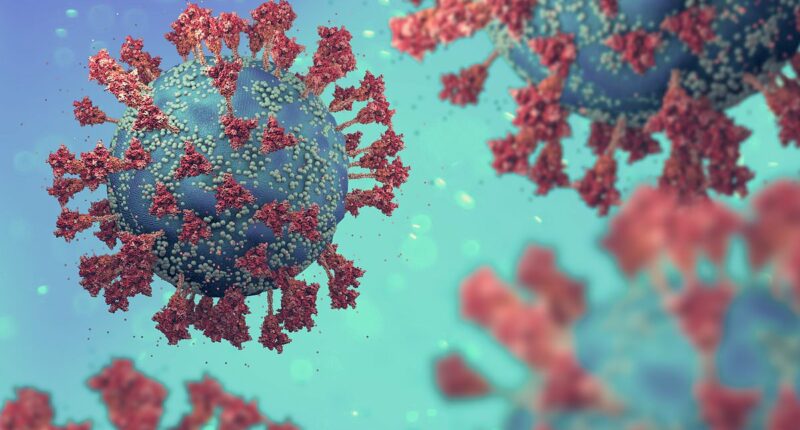Share this @internewscast.com
Long Covid, defined as experiencing Covid-like symptoms for at least three months post-infection, has often been dismissed as a figment of imagination.
However, a recent study offers hope and validation to the estimated 20 million Americans grappling with this condition.
Conducted by researchers at Harvard University, the study identifies eight unique ways in which individuals manifest Long Covid symptoms.
The research involved tracking 3,700 adults who contracted the virus during the Omicron wave, which began after December 2021.
These U.S.-based participants were monitored over a 15-month period, completing a symptoms questionnaire every three months. Only those who consistently participated throughout the 15 months were included in the analysis.
Researchers analyzed the data to categorize the patients into eight distinct groups, based on their ongoing symptoms and how these evolved over the span of a year and three months since their initial infection.
These ranged from those suffering from intense Covid symptoms at every follow-up to those who had severe Covid symptoms initially that eased over time.
Researchers hope their results will help other doctors to understand the condition and advise long Covid patients on how their condition may progress and potential therapies.

Tracey Thompson, a long Covid sufferer, said her symptoms were so severe that she considered assisted suicide. She is pictured above in the hospital in March 2022, after contracting Covid in March 2020. She developed a sore throat and lost her sense of smell

Kirsty Huxter, shown with husband David before catching Covid, said the symptoms from long Covid were so severe that she was left bedbound
Long Covid is linked to a wide range of symptoms, including fatigue, brain fog and post-exertional malaise, coughing, chest pain, heart palpitations, headaches, sleep problems, lightheadedness and joint pain.
In some cases, these symptoms have left patients feeling so unwell that they say they have considered assisted suicide.
Previous studies have suggested the condition may be caused by the immune system remaining overactive even after the initial Covid infection has been cleared.
Similar symptoms have also been recorded in people after recovering from other viral infections, in a condition called post-viral syndrome, such as the flu and Epstein-Barr virus.
There is a cohort of people, including doctors, however, who do not believe that long Covid is a real condition because of its wide variety of symptoms and the fact that there is no single test for the condition.
In the new study, published in the journal Nature Communications, scientists used data from the National Institutes of Health Researching COVID to Enhance Recovery (RECOVER) Adult Cohort study.
This recruited adults who filled in a symptom survey once every three months over 15 months after their Covid infection. Individuals who kept filling in the survey were assumed to still be suffering from Covid symptoms.
In the survey, 69 percent of participants were female and they were 49 years old on average.

There is a cohort of people, including doctors, however, who do not believe that long Covid is a real condition
Based on survey results, researchers broke down long Covid into eight different categories.
Overall, most participants, 1,301 people, were placed into the ‘consistent, minimal to no symptom burden’ group. These were individuals who occasionally reported minimal Covid-like symptoms.
The second most-common group, including 481 people, was ‘consistent, low symptom burden’ group. These were individuals who consistently reported suffering from low-level Covid-like symptoms.
The third-most common group, with 443 participants, was ‘intermittent, high symptom burden’. They had symptoms that fluctuated from mild to severe over the study period.
A total of 195 participants were placed into the most severe group, where their symptoms were ‘persistent, high burden’ across the 15 months surveyed. They suffered constantly from debilitating or severe symptoms throughout the study period.
The other groups were: ‘Improving, moderate symptom burden’, which included participants whose symptoms improved over time; ‘Worsening, moderate symptom burden’, which included participants whose symptoms worsened over time; ‘Improving, low symptom burden’, which included participants whose symptoms improved and had mostly eased after six months; and ‘delayed, worsening symptom burden’, which included participants whose symptoms worsened about 15 months after infection.
Lead researcher Dr Tanayott Thaweethai, a biostatistician at Harvard Medical School, said: ‘The variability we identified will enable future studies to evaluate risk factors and biomarkers that could explain why patients vary in time of recovery, and help identify potential therapeutic targets.’
Dr Bruce Levy, the chair of medicine at Brigham and Women’s Hospital in Boston, who was also involved in the research, added: ‘This study addresses an urgent need to define the differing long Covid trajectories.
‘Our findings will help determine what resources are needed for clinical and public health support of individuals with long Covid and will also inform efforts to understand long Covid’s biological basis.’















